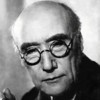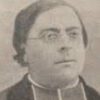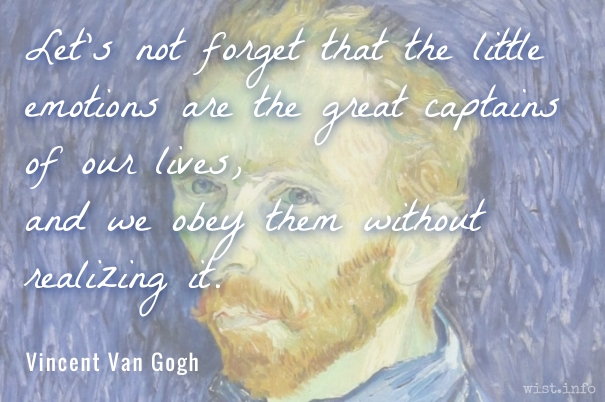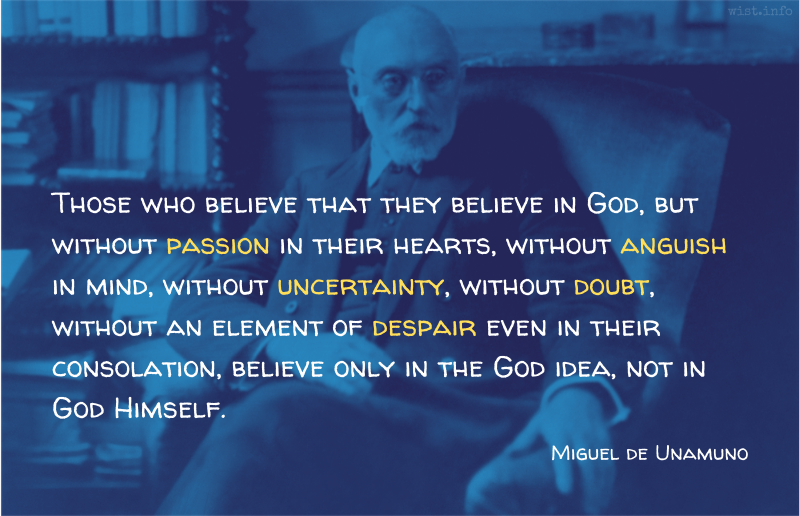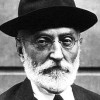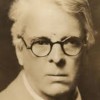Other people’s appetites easily appear excessive when one doesn’t share them.
André Gide (1869-1951) French author, Nobel laureate
The Counterfeiters, “Edouard’s Journal: Oscar Molinier” (1925)
(Source)
Quotations about:
passion
Note not all quotations have been tagged, so Search may find additional quotes on this topic.
Spiritual strength and passion, when accompanied by bad manners, only provoke loathing.
Friedrich Nietzsche (1844-1900) German philosopher and poet
The Will to Power, Part 1, “Critique of Religion,” Sec. 175 [tr. Ludovici] (1888)
(Source)
The way to avoid evil is not by maiming our passions, but by compelling them to yield their vigor to our moral nature. Thus they become, as in the ancient fable, the harnessed steeds which bear the chariot of the sun.
This is no day for the rabble-rouser, whether he be Negro or white. We must realize that we are grappling with the most weighty social problem of this nation, and in grappling with such a complex problem there is no place for misguided emotionalism. We must work passionately and unrelentingly for the goal of freedom, but we must be sure that our hands are clean in the struggle. We must never struggle with falsehood, hate, or malice. We must never become bitter. I know how we feel sometime. There is the danger that those of us who have been forced so long to stand amid the tragic midnight of oppression—those of us who have been trampled over, those of us who have been kicked about — there is the danger that we will become bitter. But if we will become bitter and indulge in hate campaigns, the new order which is emerging will be nothing but a duplication of the old order.
Martin Luther King, Jr. (1929-1968) American clergyman, civil rights leader, social activist, preacher
“Give Us the Ballot,” Speech, Prayer Pilgrimage for Freedom, Washington, DC (1957)
(Source)
The truth is always in the minority, and the minority is always stronger than the majority, because as a rule the minority is made up of those who actually have an opinion, while the strength of the majority is illusory, formed of that crowd which has no opinion — and which therefore the next moment (when it becomes clear that the minority is the stronger) adopts the latter’s opinion, which now is in the majority, i.e., becomes rubbish by having the whole retinue and numerousness on its side, while the truth is again in a new minority.
Take a book, the poorest one written, but read it with the passion that it is the only book you will read — ultimately you will read everything out of it, that is, as much as there was in yourself, and you could never get more out of reading, even if you read the best of books.
You must look into people, as well as at them. Almost all people are born with all the passions, to a certain degree; but almost every man has one prevailing one, to which the others are subordinate. Search every one for that ruling passion; pry into the recesses of his heart, and observe the different workings of the same passion in different people; and when you have found out the prevailing passion of any man, remember never to trust him where that passion is concerned. Work upon him by it, if you please; but be upon your guard yourself against it, whatever professions he may make you.
Lord Chesterfield (1694-1773) English statesman, wit [Philip Dormer Stanhope]
Letter to his son, #112 (4 Oct 1746)
(Source)
The profit of books is according to the sensibility of the reader. The profoundest thought or passion sleeps as in a mine, until an equal mind and heart finds and publishes it.
What the tender poetic youth dreams, and prays, and paints to-day, but shuns the ridicule of saying aloud, shall presently be the resolutions of public bodies, then shall be carried as grievance and bill of rights through conflict and war, and then shall be triumphant law and establishment for a hundred years, until it gives place, in turn, to new prayers and pictures.
Ralph Waldo Emerson (1803-1882) American essayist, lecturer, poet
“Politics,” Essays: Second Series (1844)
(Source)
This quotation is more often given as the paraphrase used by another speaker of the era, the abolitionist Wendell Phillips:
What the tender and poetic youth dreams to-day, and conjures up with inarticulate speech, is to-morrow the vociferated result of public opinion, and the day after is the charter of nations.
Phillips used this phrase, prefixed with, "As Emerson says," and in quotation marks, at least twice. First in his lecture "Harper's Ferry" (1 Nov 1859), Brooklyn. Second, in a different context, in "The Scholar in a Republic" (30 Jun 1881), a famous speech at the centennial of the Phi Beta Kappa society at Harvard University.
Emerson did not use this shorter phrasing, however, in any of his written works, and frequent attributions of it to him are in error.
Reason! reason! … As much as you like; but beware of thinking that it answers to everything, suffices for everything, satisfies everything. This mother loses her child: will reason comfort her? Does cool reason counsel the inspired poet, the heroic warrior, the lover? Reason guides but a small part of man, and that the least interesting. The rest obeys feeling, true or false, and passion, good or bad.
Joseph Roux (1834-1886) French Catholic priest
Meditations of a Parish Priest: Thoughts, ch. 4, #95 (1886)
(Source)
Executions, far from being useful examples to the survivors, have, I am persuaded, a quite contrary effect, by hardening the heart they ought to terrify. Besides, the fear of an ignominious death, I believe, never deterred anyone from the commission of a crime, because in committing it the mind is roused to activity about present circumstances.
Let’s not forget that the little emotions are the great captains of our lives, and we obey them without realizing it.
It is folly to pretend that one ever wholly recovers from a disappointed passion. Such wounds always leave a scar. There are faces I can never look upon without emotion. There are names I can never hear spoken without almost starting.
The voice of passion is better than the voice of reason.
The passionless cannot change history.Czesław Miłosz (1911-2004) Polish-Lithuanian poet, essayist, diplomat
“The Child of Europe” (1946)
(Source)
I know I was writing stories when I was five. I don’t know what I did before that. Just loafed, I suppose.
P. G. Wodehouse (1881-1975) Anglo-American humorist, playwright and lyricist [Pelham Grenville Wodehouse]
“The Art of Fiction #60,” interview with Gerald Clarke, The Paris Review (Winter 1975)
(Source)
Write while the heat is in you. When the farmer burns a hole in his yoke, he carries the hot iron quickly from the fire to the wood, for every moment is less effectual to penetrate (pierce) it. It must be used instantly or it is useless. The writer who postpones the recording of his thoughts uses an iron which has cooled to burn a hole with. He cannot inflame the minds of his audience.
If you mean to make your side of the argument appear plausible, do not prejudice the people against what you think truth by your passionate manner of defending it.
James Burgh (1714-1775) British politician and writer
The Dignity of Human Nature, Sec. 5 “Miscellaneous Thoughts on Prudence in Conversation” (1754)
(Source)
We should have a glorious conflagration if all who cannot put fire into their works would only consent to put their works into the fire.
Charles Caleb "C. C." Colton (1780-1832) English cleric, writer, aphorist
Lacon: Or, Many Things in Few Words, Vol. 1, Preface (1820)
(Source)
It is very natural for young men to be vehement, acrimonious and severe. For as they seldom comprehend at once all the consequences of a position, or perceive the difficulties by which cooler and more experienced reasoners are restrained from confidence, they form their conclusions with great precipitance. Seeing nothing that can darken or embarrass the question, they expect to find their own opinion universally prevalent, and are inclined to impute uncertainty and hesitation to want of honesty, rather than of knowledge.
Samuel Johnson (1709-1784) English writer, lexicographer, critic
The Rambler, #121 (14 May 1751)
(Source)
A man makes his inferiors his superiors by heat. […] Self-control is the rule.
Ralph Waldo Emerson (1803-1882) American essayist, lecturer, poet
“Social Aims,” lecture, Boston (1864-12-04), Letters and Social Aims (1875)
(Source)
Love conquers all; let us, too, yield to Love!
[Omnia vincit amor; et nos cedamus amori.]
Virgil (70-19 BC) Roman poet [b. Publius Vergilius Maro; also Vergil]
Eclogues [Eclogae, Bucolics, Pastorals], No. 10 “Gallus,” l. 69 (10.69) (42-38 BC) [tr. Fairclough (Loeb) (1916)]
(Source)
(Source (Latin)). Alternate translations:
Love conquers all, let us give place to love.
[tr. Ogilby (1649)]
In Hell, and Earth, and Seas, and Heav'n above,
Love conquers all; and we must yield to Love.
[tr. Dryden (1709), ll. 98-99]
Love conquers all; and we must yield to love.
[tr. Wrangham (1830), l. 81]
Love conquers all; and let us yield to love.
[tr. Davidson (1854)]
Love's lord of all. Let me too yield to Love.
[tr. Calverley (c. 1871)]
Love conquers all nature; we too must yield to love.
[tr. Wilkins (1873)]
Love reigns with undisputed sway,
And we the mighty god obey.
[tr. King (1882), ll. 1009-10]
Love will but tamper with the shaft he drove.
And we must yield to all-subduing Love.
[tr. Palmer (1883)]
Love conquers all things; yield we too to love!
[tr. Greenough (1895)]
Love conquers everything; let us also yield to love.
[tr. Bryce (1897)]
Love conquers all: let us too yield to Love.
[tr. Mackail (1899)]
Love conquers all things -- let us yield to love.
[tr. Mackail/Cardew (1908)]
Love masters all. We, too, submit to love.
[tr. Williams (1915)]
Love carries all before him: I too must yield to Love.
[tr. Rieu (1949)]
Love is the tyrant
Of all, so let me bow to his domination.
[tr. Johnson (1960)]
All-conquering is Love -- no use to fight against him.
[tr. Day Lewis (1963)]
Love conquers all, and all must yield to love.
[tr. Ferry (1999)]
Love conquers all: and let us give way to Love.
[tr. Kline (2001)]
JULIET: My bounty is as boundless as the sea,
My love as deep; the more I give to thee,
The more I have, for both are infinite.William Shakespeare (1564-1616) English dramatist and poet
Romeo and Juliet, Act 2, sc. 2, l. 139ff (2.2.139-141) (c. 1594)
(Source)
Their mistakes are always due to lack of moderation and taking things too far, contrary to Chilon’s saying. That is, they do everything to excess: they love excessively, they hate excessively, and so on and so forth.
καὶ ἅπαντα ἐπὶ τὸ μᾶλλον καὶ σφοδρότερον ἁμαρτάνουσι, παρὰ τὸ Χιλώνειον (πάντα γὰρ ἄγαν πράττουσιν: φιλοῦσι γὰρ ἄγαν καὶ μισοῦσιν ἄγαν καὶ τἆλλα πάντα ὁμοίως), καὶ εἰδέναι ἅπαντα οἴονται καὶ διισχυρίζονται (τοῦτο γὰρ αἴτιόν ἐστιν καὶ τοῦ πάντα ἄγαν)
Aristotle (384-322 BC) Greek philosopher
Rhetoric [Ῥητορική; Ars Rhetorica], Book 2, ch. 12, sec. 14 (2.12.14) / 1389b (350 BC) [tr. Waterfield (2018)]
(Source)
Speaking of youth.
Chilon was one of "the Seven Wise Men" of Greece. His maxim was "Μηδὲν ἄγαν" ["Never go to extremes."] (Diogenes Laertius, Lives of Eminent Philosophers, 1.41)
(Source (Greek)). Alternate translations:
- "And all their errors are on the side of excess, and too much zeal, contrary to Chilo's rule; for they carry every thing too far. For they are extreme in their friendships, and in their hates, and in all other their actions are similarly excessive." [Source (1847)]
- "And all their errors are on the side of excess and too great earnestness, in contravention of Chilo's rule; for the young carry everything to an excess; for their friendships are in excess, their hatreds are in excess, and they do everything else with the same degree of earnestness." [tr. Buckley (1850)]
- "All their mistakes are on the side of excess or vehemence -- against the maxim of Chilon; they do everything too much; they loe to much, hate too much, and so in all else." [tr. Jebb (1873)]
- "All their mistakes are in the direction of doing things excessively and vehemently. They disobey Chilon's precept by overdoing everything, they love too much and hate too much, and the same thing with everything else." [tr. Roberts (1924)]
- "All their errors are due to excess and vehemence and their neglect of the maxim of Chilon, for they do everything to excess, love, hate, and everything else." [tr. Freese (1926)]
- "And quite all the mistakes they make tend in the direction of excess and vehemence, in violation of the saying of Chilon, for they do all things excessively: they feel friendly affection to excess and hatred to excess, and all else similarly." [tr. Bartlett (2019)]
All love that has not friendship for its base
Is like a mansion built upon the sand.
We are constantly railing against the passions; we ascribe to them all of man’s afflictions, and we forget that they are also the source of all his pleasures.
Hence a young man is not a proper hearer of lectures on political science; for he is inexperienced in the actions that occur in life, but its discussions start from these and are about these; and, further, since he tends to follow his passions, his study will be vain and unprofitable, because the end aimed at is not knowledge but action.
[διὸ τῆς πολιτικῆς οὐκ ἔστιν οἰκεῖος ἀκροατὴς ὁ νέος: ἄπειρος γὰρ τῶν κατὰ τὸν βίον πράξεων, οἱ λόγοι δ᾽ ἐκ τούτων καὶ περὶ τούτων: ἔτι δὲ τοῖς πάθεσιν ἀκολουθητικὸς ὢν ματαίως ἀκούσεται καὶ ἀνωφελῶς, ἐπειδὴ τὸ τέλος ἐστὶν οὐ γνῶσις ἀλλὰ πρᾶξις.]
Aristotle (384-322 BC) Greek philosopher
Nicomachean Ethics [Ἠθικὰ Νικομάχεια], Book 1, ch. 3 (1.3.5-6) / 1095a.2-5 (c. 325 BC) [tr. Ross (1908)]
(Source)
(Source (Greek)). Alternate translations:
Hence the young man is not a fit student of Moral Philosophy, for he has no experience in the actions of life, while all that is said presupposes and is concerned with these: and in the next place, since he is apt to follow the impulses of his passions, he will hear as though he heard not, and to no profit, the end in view being practice and not mere knowledge.
[tr. Chase (1847), ch. 1]
And hence it is that a young man is not a fit student of the art political; for he has had no experience in matters of daily life, with which matters our premises are concerned, and of which our conclusions treat. And since, moreover, he is prone to follow his desires, he will listen without purpose, and so without benefit. For the true object of ethical study is not merely the knowledge of what is good, but the application of that knowledge.
[tr. Williams (1869), sec. 3]
Hence the young are not proper students of political science, as they have no experience of the actions of life which form the premises and subjects of the reasonings. Also it may be added that from their tendency to follow their emotions they will not study the subject to any purpose or profit, as its end is not knowledge but action.
[tr. Welldon (1892), ch. 1]
And hence a young man is not qualified to be a student of Politics; for he lacks experience of the affairs of life, which form the data and the subject-matter of Politics. Further, since he is apt to be swayed by his feelings, he will derive no benefit from a study whose aim is not speculative but practical.
[tr. Peters (1893)]
Hence the young are not fit to be students of Political Science. For they have no experience of life and conduct, and it is these that supply the premisses and subject matter of this branch of philosophy. And moreover they are led by their feelings; so that they will study the subject to no purpose or advantage, since the end of this science is not knowledge but action.
[tr. Rackham (1934)]
That is why a young person is not a suitable audience for politics. For he has no experience with the actions of life, and the accounts are in accord with these and concerned with these. Further, since he tends to follow his feelings, it will be pointless and not beneficial to him to be in the audience, since the end is not knowledge but action.
[tr. Reeve (1948)]
In view of this, a young man is not a proper student of [lectures on] politics; for he is inexperienced in actions concerning human life, and discussions proceed from [premisses concerning those actions] and deal with [those actions]. Moreover, being disposed to follow his passions, he will listen in vain and without benefit, since the end of such discussions is not knowledge but actions.
[tr. Apostle (1975), ch. 1]
This is why a young man is not a fit person to attend lectures on political science, because he is not versed in the practical business of life from which politics draws its premisses and subject matter. Besides, he tends to follow his feelings, with the result that he will make no headway and derive no benefit from his course, since the object of it is not knowledge but action.
[tr. Thomson/Tredennick (1976)]
This is why a youth is not a suitable student of political science; for he lacks experience of the actions of life which political science argues from and about. Moreover, since he tends to be guided by his feelings, his study will be futile and useless; for its end is action, not knowledge.
[tr. Irwin/Fine (1995)]
This is why a young person is not fitted to hear lectures on political science, since our discussions begin from and concern the actions of life, and of these he has no experience. Again, because of his tendency to follow his feelings, his studies will be useless and to no purpose, since the end of the study is not knowledge but action.
[tr. Crisp (2000)]
Hence of the political art, a young person is not an appropriate student, for he is inexperienced in the actions pertaining to life, and the arguments are based on these actions and concern them. Further, because he is disposed to follow the passions, he will listen pointlessly and unprofitably, since the end involved is not knowledge but action.
[tr. Bartlett/Collins (2011)]
Note that this passage was the basis for these lines from Shakespeare, Troilus and Cressida, Act 2, sc. 2, l. 165 (1609):
Young men, whom Aristotle thought
Unfit to hear moral philosophy
The degree of one’s emotions varies inversely with one’s knowledge of the facts — the less you know the hotter you get.
Matters of religion should never be matters of controversy. We neither argue with a lover about his taste, not condemn him, if we are just, for knowing so human a passion.
George Santayana (1863-1952) Spanish-American poet and philosopher [Jorge Agustín Nicolás Ruíz de Santayana y Borrás]
The Life of Reason or The Phases of Human Progress, Vol. 3 “Reason in Religion,” ch. 6 “The Christian Epic” (1905-06)
(Source)
To be interested in the changing seasons is, in this middling zone, a happier state of mind than to be hopelessly in love with spring.
George Santayana (1863-1952) Spanish-American poet and philosopher [Jorge Agustín Nicolás Ruíz de Santayana y Borrás]
The Life of Reason or The Phases of Human Progress, Vol. 4 “Reason in Art,” ch. 9 “Justification of Art” (1905-06)
Full text.
Those who believe that they believe in God, but without passion in their hearts, without anguish in mind, without uncertainty, without doubt, without an element of despair even in their consolation, believe only in the God idea, not in God Himself.
[Los que sin pasión de ánimo, sin congoja, sin incertidumbre, sin duda, sin la desesperación en el consuelo, creen creer en Dios, no creen sino en la idea de Dios, más no en Dios mismo.]
Miguel de Unamuno (1864-1936) Spanish philosopher and writer [Miguel de Unamuno y Jugo]
The Tragic Sense of Life [Del sentimiento trágico de la vida], ch. 9 “Faith, Hope, and Charity” (1912) [tr. Flitch (1921)]
(Source)
Alt. trans. [tr. Kerrigan (1972)]: "Whoever believes he believes in God, but believes without passion, without anguish, without uncertainty, without doubt, without despair-in-consolation, believes only in the God-Idea, not in God Himself."
Original Spanish.
In Unamuno's earlier, unpublished work Treatise on the Love of God [Tratado del amor de Dios], ch. 3 "What is Faith?" (1905-08) [tr. Orringer], he used this same phrase and surrounding text: "Those without passion in their soul, without anguish, without uncertainty, without doubt, without despair in consolation, think they believe in God; they believe only in the idea of God, but not in God Himself."
Turning and turning in the widening gyre
The falcon cannot hear the falconer;
Things fall apart; the centre cannot hold;
Mere anarchy is loosed upon the world,
The blood-dimmed tide is loosed, and everywhere
The ceremony of innocence is drowned;
The best lack all conviction, while the worst
Are full of passionate intensity.William Butler Yeats (1865-1939) Irish poet and dramatist
“The Second Coming,” ll.1-8 (1920)
(Source)
More examination of this quotation: The Best Lack All Conviction While the Worst Are Full of Passionate Intensity – Quote Investigator. See also Russell and Bukowski.
One will weave the canvas; another will fell a tree by the light of his ax. Yet another will forge nails, and there will be others who observe the stars to learn how to navigate. And yet all will be as one. Building a boat isn’t about weaving canvas, forging nails, or reading the sky. It’s about giving a shared taste for the sea, by the light of which you will see nothing contradictory but rather a community of love.
[Celui-là tissera des toiles, l’autre dans la forêt par l’éclair de sa hache couchera l’arbre. L’autre, encore, forgera des clous, et il en sera quelque part qui observeront les étoiles afin d’apprendre à gouverner. Et tous cependant ne seront qu’un. Créer le navire ce n’est point tisser les toiles, forger les clous, lire les astres, mais bien donner le goût de la mer qui est un, et à la lumière duquel il n’est plus rien qui soit contradictoire mais communauté dans l’amour.]
Antoine de Saint-Exupéry (1900-1944) French writer, aviator
Citadelle [The Wisdom of the Sands], ch. 75 (1948)
(Source (French))
This looks to be the origin of the following, more common attributions to Saint-Exupery:
This quotation (and variation) are discussed here: Teach Them to Yearn for the Vast and Endless Sea – Quote Investigator. That article may in fact be the source of the English translation above; the standard translation does not translate much of ch. 75 as found in the above French. It includes only:
- "If you wish to build a ship, do not divide the men into teams and send them to the forest to cut wood. Instead, teach them to long for the vast and endless sea."
- "If you want to build a ship, don’t drum up people together to collect wood and don’t assign them tasks and work, but rather teach them to long for the endless immensity of the sea."
- "If you want to build a ship, don’t drum up the men and women to gather wood, divide the work, and give orders. Instead, teach them to yearn for the vast and endless sea."
- "If you want to build a ship, don't drum up the workers to gather wood, don't divide the work and give orders. Instead, teach them to yearn for the vast and endless sea."
Instill in a people’s heart the love of sailing ships, and it will draw into itself all that is fervent in your land and transmute it into sails and rigging.
[tr. Gilbert (1950)]
Absence diminishes mediocre passions and increases great ones, as the wind blows out candles and fans flames.
[L’absence diminue les médiocres passions, et augmente les grandes, comme le vent éteint les bougies et allume le feu.]
François VI, duc de La Rochefoucauld (1613-1680) French epigrammatist, memoirist, noble
Réflexions ou sentences et maximes morales [Maxims], #276 (1665-1678)
Alt. trans.: "Absence lessens the minor passions and increases the great ones, as the wind douses a candle and kindles a fire."
(See DeBussy)
KEATING: We don’t read and write poetry because it’s cute. We read and write poetry because we are members of the human race. And the human race is filled with passion. And medicine, law, business, engineering, these are noble pursuits and necessary to sustain life. But poetry, beauty, romance, love, these are what we stay alive for.
The lust for comfort, that stealthy thing that enters the house a guest, and then becomes a host, and then a master. […] Verily the lust for comfort murders the passion of the soul, and then walks grinning in the funeral.
Kahlil Gibran (1883-1931) Lebanese-American poet, writer, painter [Gibran Khalil Gibran]
The Prophet, “On Houses” (1923)
(Source)
This is the true joy in life, the being used up for a purpose recognized by yourself as a mighty one; the being thoroughly worn out before you are thrown on the scrap heap; the being a force of Nature instead of a feverish selfish little clod of ailments and grievances complaining that the world will not devote itself to making you happy.
George Bernard Shaw (1856-1950) British playwright and critic
Man and Superman, “Epistle Dedicatory” (1903)
(Source)
Absence is to love what wind is to fire;
It extinguishes the small, it enkindles the great.[L’absence est a l’amour ce qu’est au feu le vent;
Il eteint le petit, il allume le grand.]Roger de Rabutin, Comte de Bussy (1618-1693) French soldier, libertine, writer [a.k.a. Roger Bussy-Rabutin]
Histoire amoureuse des Gaules, “Maximes d’amour [Maxims of Love]” (1660)
See La Rochefoucauld.
I bid you strike at the passions; and if you do, you too will prevail. If you can once engage people’s pride, love, pity, ambition (or whichever is their prevailing passion) on your side, you need not fear what their reason can do against you.
Lord Chesterfield (1694-1773) English statesman, wit [Philip Dormer Stanhope]
Letter to his son, #105 (8 Feb 1746)
(Source)
Serving one’s own Passions is the greatest Slavery.
Thomas Fuller (1654-1734) English physician, preacher, aphorist, writer
Gnomologia: Adages and Proverbs, #4103 (1732)
(Source)
Act nothing in furious Passion; it’s putting to Sea in a Storm.
Thomas Fuller (1654-1734) English physician, preacher, aphorist, writer
Introductio ad Prudentiam, Vol. 1, # 365 (1725)
(Source)
He rather hated the ruling few than loved the suffering many.
Jeremy Bentham (1748-1832) English jurist and philosopher
Comment on James Mill
(Source)
In the journal of Caroline Fox (7 Aug 1840), regarding the father of John Stuart Mill. James Mill was a proponent of Bentham's philosophy. The observation was recalled in conversation with John Bowring, Bentham's executor.

